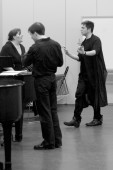Fail Whale
from Wednesday, October21st of the year2009.
So the Opera World, despite what you might have been told, really isn’t the same thing as the classical music world. I’ve found a much bigger correlation between the instrumental classical world and, say, indie rock than between instrumental classical and opera ““ just in terms of Administrative Strategy, Musicianship, Personalities one encounters.
I want to briefly talk about the musicianship thing because it’s really interesting to me. With me and my friends “” and I’m thinking specifically of Nadia Sirota, my longtime collaboratrix “” I like to think that the musicianship hierarchy has rhythm very near the top of the scheme, surrounded by its acolytes “making a beautiful sound” and “understanding context.” With opera singers, it’s switched around for good reason “” the “context” is so hugely important inasmuch as it is the entire reason for the opera being there in the first place. This is hugely reductive so it’s better if I speak from specific example.
Two weeks ago, I was workshopping (I’m so embarrassed to use that as a verb, actually. Let me redact and correct). Two weeks ago, I was overseeing a workshop of this opera I wrote called Two Boys. The point of a workshop for opera seems to be multi-faceted “” it means one thing to the producing organization, another thing to the singers, another thing to me as a composer, and another thing to the librettist. Even as the composer, my interests were folded up: does the music work as music? Does the music assist the drama? Does the music bear the correct relationship to the drama? It’s complicated.
The singers I was working with were fabulous, fabulous, fabulous. And I very quickly learned that the more fabulous they were, the more interesting their approach to rhythm was. I also learned that my music has two different kinds of rhythm in it. The first kind is the locked down, Reichy, Rousey syncopated thing that has to be right on the nose: think Jenga. Then there is another thing, a cantabile thing, where the rhythm as she is notated is an invisible structure over which fabric is draped. Singers are good at both kinds, but they need to be told (or be able to intuit) which is appropriate.
Another interesting thing about singers (and, to a certain extent, opera pianist/coaches) “” sort of like horses, certain fetish-objects spook them. Almost all of these fetish-objects are rhythmic. A bar in 5/4 is terrifying and nervous making whereas 2/4 + 3/4 is completely fine, elegant, gorgeously spun sugar. In my experience, written-out rubato à la Adams works great if you have an eternity to rehearse it but notating a straight rhythm and then telling them “relax” helps. And, my favorite thing: if there’s a tricky, woodworky dovetailed series of rhythms as a duet, the minute you say to them, “don’t do any of the rhythms. Just do it naturally” is the minute they sing it precisely as the score indicates ““ perfectly in time, naturally delivered. I felt like Temple Grandin when I figured that out. Some pictures!

Me, Joseph Lawson, conductor, Margaret Gawrysiak

Me with Craig Lucas, the wonderful librettist
photos by Matthew Brown
Then, a week after that finished, I spoke, alongside Lisa Bielawa, Rufus Wainwright, and Peter Sellars at the New Yorker Festival. Here is a slightly misleading recap. I say misleading because Peter actually introduced the “whale” idea. I said, you know, even though it might be this giant deadish thing in some people’s minds, a whale fall can be a wonderful place for organisms to grow. Which is, basically, my attitude about all culture things: even if they get huge and bloated and die, it all regenerates in an exciting and possibly shrimp-flavored way.
Not everybody shares my attitude, though. Check out this page of people hating on me. Then imagine waking up in the morning, reading the internet, and taking the time to compose the following comment:
With a legion of mediocre crossover minimalist arrangers pretending to be composers swarming around Hoxton there is absolutely no need to import another. This kid’s opus is dead in the water. Already.
Now, I excerpt this one because it relates to the whaling issue, one, and two, it uses the “Already” enjambment or whatever the fuck. But it’s also curious and amazing to wish failure on anything. I’m less bothered by the people who spent three seconds on YouTube googling my collaborative projects (with Teitur and Sam Amidon), made a video montage, hated on it talking about earplugs than by the notion that whatever I’m doing deserves to ““ is predestined to ““ fail. I think this is an attitude unique to the opera world: this vicious desire to see others suffer both onstage and behind the scenes. This is, in fact, one of the themes of my opera. So I cordially invite the author of this post to please be my guest whenever this opera happens. We can meet for a drink at the Hoxton hotel and process down Commercial Street to St John Bread & Wine, and then take a cab to the show. I’m srs. Call me on the +44. It’s really pretty! There are no electronics in it!
But in all seriousness, I need to win these people over for both our sakes. I don’t want to witness or participate in a combative attitude about new work; it’s disgusting and embarrassing for everybody. Imagine if the internet were filled with people wishing well for the future of the genre! I’m going to turn these queens to the light somehow, through a combination of a charm offensive and writing good work. If that’s not enough, I don’t know what is.
I’m in Los Angeles. I was in traffic for four hours yesterday with only Orlando Gibbons to keep me company. He is so, so, so, so, great.

10 Comments
October 22nd, 2009 at 3:57 am
It was pretty cool the other day to talk to my friend Nic Filzin for the first time in a long while, and to hear that he had sung in your opera. I was proud of both of you!
October 22nd, 2009 at 9:09 am
Take no notice of what the journalists write here in England. You are very gifted indeed and are just at the start of a wonderful career. Follow your inner light and all manner of thing shall be well.
October 22nd, 2009 at 12:07 pm
“I’m going to turn these queens to the light somehow, through a combination of a charm offensive and writing good work. If that’s not enough, I don’t know what is.”
Creating great music is the best revenge.
October 22nd, 2009 at 1:20 pm
Cunty, evil British critics have been behaving this way for decades, and their effect has in many respects been hugely destructive. Ever wonder why Howells, say, never wrote an opera? It wasn’t because he was incapable of it or uninterested in the genre.
They won’t stop hating you. Why? Because you commit the offence of writing music people want to perform and listen to and that moves their souls. They can’t risk a positive response to your music because they might be thought unsophisticated. It’s as though a composer is expected to pay a price for the privilege of having his or her music performed and received with favour by the critics, and that price is to sacrifice popular acclaim. You are seen as not having paid your dues, and they are way too fraught with ressentiment ever to permit you to succeed. But it doesn’t matter: you will anyway, and indeed already have.
October 22nd, 2009 at 2:38 pm
Bernard Herrmann said in 1971: “The only thing I ever did do that was foolhardy was to write an opera [WUTHERING HEIGHTS]. Franz Liszt said that you have to have the soul of a hero to write an opera and the mentality of a lackey to have it produced.â€
Nico, continue to have the soul of a hero and ignore the lackey mentality that pervades critics and the Internet. (To my fellow commenters, trust me, opinions originating from the US are no better.) Trust your vision, and to quote Bette Midler : “F*** ’em if they can’t take a joke!”
October 22nd, 2009 at 3:04 pm
It’s sad on so many levels that certain journalists are talking shit about you – especially when there are so many utterly terrible bands and musicians out there who are being championed by the mainstream press. (I had to interview a particularly dim musician recently, and it made me fear for the future of the human race. Honestly, the amount of idiots who believe they’re God’s gift is frightening. But I digress…)\nBut the important thing is not to lose faith, not to let their petty nastiness affect what you think of your work. \n\nThe problem with coming to the attention of the media, in whatever musical arena you’re in, is that some people seem to automatically assume you’re not entitled to be there. And they generally fail to realise that you don’t tell journalists what to write about you – you don’t choose whether they call you the saviour of classical music or not.\n\nThe idea that someone believes your career is predestined to fail speaks more about their idiocy than your ability, so really, why give a fuck about what they have to say? \nJust keep doing what you’re doing, and forget about the naysayers and miserablists.
October 22nd, 2009 at 11:40 pm
As a singer- Re: rhythm notation, I agree that some rhythms must be extremely precise and others are very cantabile. But: I think it’s really important to notate which is which, because whichever one you choose (or intuit), someone (a conductor, coach, whoever) will tell you it should be the opposite.
October 23rd, 2009 at 8:51 am
HA! Temple Grandin! AINT THAT THE AUTISTIC PERSON WHO FIGURED OUT
HOW TO DESIGN LIVESTOCK RUNWAYS FROM THE POINT OF VIEW OF THE ANIMAL?
October 27th, 2009 at 2:30 am
Don Giovanni is “super-rapey.” Gold.
November 9th, 2009 at 6:59 pm
To JL: I agree that U.S. critics can at times be no better (I still get in a tizzy when I think about what happened to Paul Bunyan), but having said that I think there are more good writers on musical topics in the U.S. now than there have ever been. And to be fair, there are and always have been lots in the U.K. also.
To all: I’m sorry if my earlier comments seemed intemperate. I do however think that some of the folks on parterre are way out of line.
Gibbons is indeed sublime.